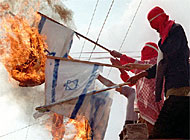
Jerusalem centre studies Swiss model for conflict resolution

The Arab-Israeli conflict may seem as intractable as ever, but a number of institutions are continuing their efforts to find a way out of the impasse. One is the Swiss Centre for Research, Conflict Management and Resolution, based at Jerusalem's Hebrew University.
“We live in a world of conflict. Switzerland has a lot to teach the world about how it has managed to live in peace for so many years,” says David Wollach, president of the Association of Swiss Friends of the Hebrew University.
The Swiss centre was founded two years ago with the help of private Swiss funds. Headed by the respected professor, Yaacov Bar Siman-tov, it seeks to adopt an interdisciplinary approach to resolving all kinds of conflict, from family disputes, through labour relations to the international problems with which the region is all too familiar.
The conflict between Jews and Arabs – both inside and outside Israel – is not the only one that afflicts Israeli society. There are also strong tensions between religious and secular Jews and between Ashkenazi and Oriental Jews, as well as the divide between rich and poor that affects many societies.
One of the Swiss Centre’s main activities is training young people to be mediators and negotiators to deal with such conflicts. And, wherever possible, it endeavours to incorporate the Swiss model into its studies.
“Switzerland can be an example. Swiss co-existence is very unique,” says Bar Siman-tov, pointing out that the way four distinct linguistic and cultural populations have joined together to form a single, peaceful nationality is held in great esteem throughout the world.
He adds that the idea of cantonisation – the way the Swiss devolve certain powers to semi-autonomous regions – is something that the people of the Middle East can learn from. Swiss neutrality, he says, is also an important area of study, even if Israel is never likely to be a neutral state.
Bar Siman-tov also points out that Switzerland has improved its standing by providing a home for many organisations that promote peace and conflict resolution.
“Although we have different cultures and different religions, I believe if we can adapt the Swiss experience carefully, we can move in a better direction,” he told swissinfo.
Bar Siman-tov is in Switzerland for a series of three conferences in Geneva and Zurich covering such topics as reconciliation and collective memory, the role of religion and culture in conflict resolution, and mediation.
The Swiss Centre of the Hebrew University has links with many universities around the world, including Palestinian ones. Although these ties have been difficult to maintain in recent months, given the worsening political climate, Bar Siman-tov believes academics may be able to fill a role that the increasingly polarised politicians are unable or unwilling to play.
“The Oslo process was established by two professors, and only later taken up by the politicians,” he points out. “There is no trust between the leaderships of the two sides. Perhaps the intellectuals can contribute by occupying this gap and establish a dialogue.”
The Swiss Centre plays a dual role: not only does it try to promote the search for peace and stability, it also serves as an important public relations vehicle for Switzerland itself, despite being privately funded.
The country’s dubious role during the Second World War – the failure by banks to release dormant Holocaust-era accounts, the decision by the authorities to turn back Jewish refugees at the border – served to sour relations with Israel and the powerful Jewish lobby in the United States.
“A few years ago, Switzerland had a very bad reputation,” David Wollach says. “We didn’t appreciate the need to promote what was good.”
“We have learned from that. We are a modern country with a lot of new ideas to offer,” he told swissinfo.
by Roy Probert

In compliance with the JTI standards
More: SWI swissinfo.ch certified by the Journalism Trust Initiative


























You can find an overview of ongoing debates with our journalists here . Please join us!
If you want to start a conversation about a topic raised in this article or want to report factual errors, email us at english@swissinfo.ch.